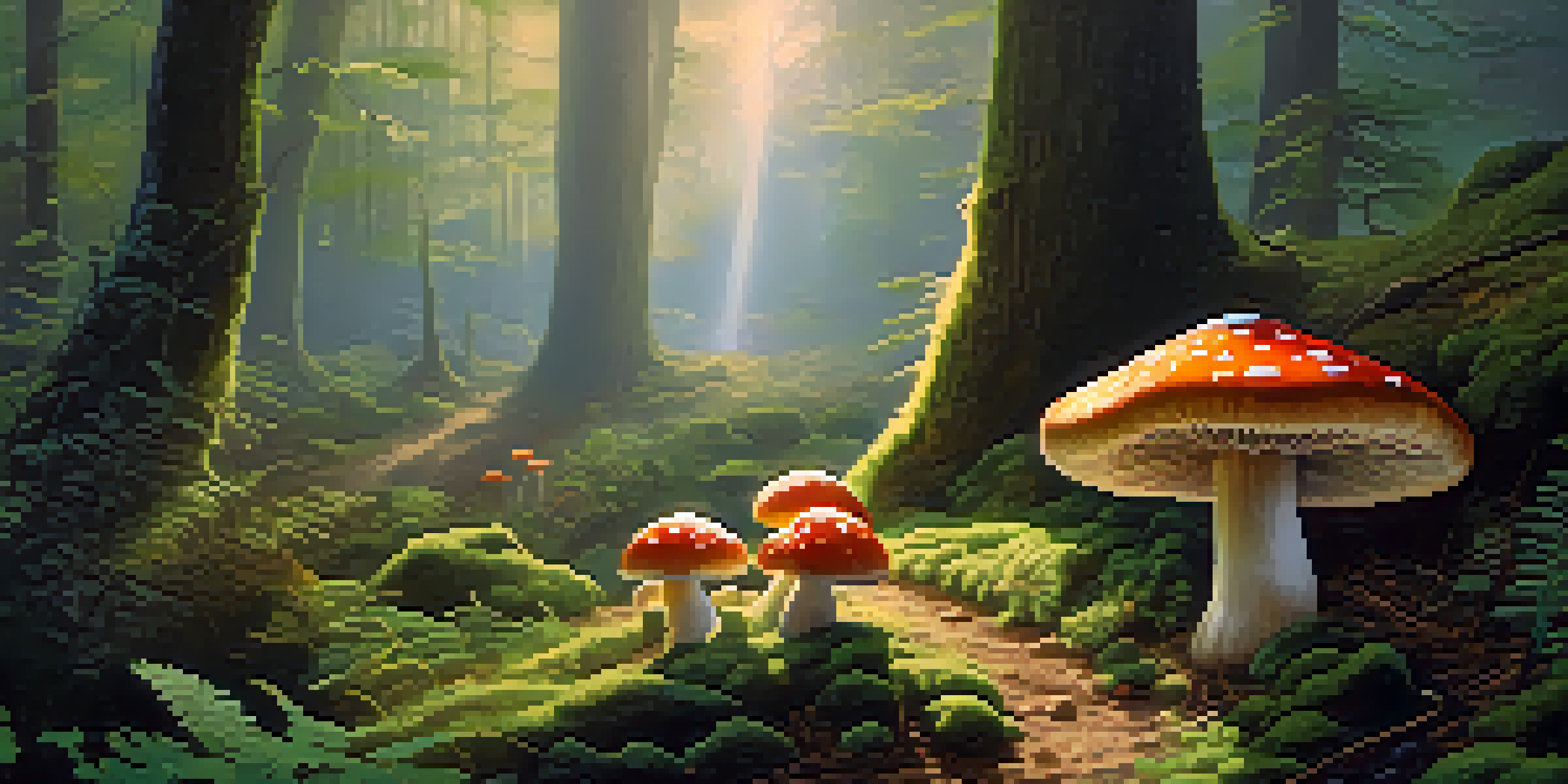Entheogens and Global Health Trends: A New Frontier

Understanding Entheogens and Their Cultural Significance
Entheogens, substances like psilocybin mushrooms and ayahuasca, have been used for centuries in various cultures for spiritual and therapeutic purposes. They often serve as tools for introspection, healing, and connecting with a higher consciousness. The resurgence of interest in these substances highlights their potential to influence mental health positively and foster emotional well-being.
The use of entheogens as a means to explore consciousness is not just about the substances themselves, but about the experiences they facilitate and the insights they provide.
In many indigenous cultures, entheogens are integrated into rituals and ceremonies, promoting community bonding and personal growth. These practices underscore the importance of a holistic approach to health, where the mind, body, and spirit are interconnected. As the modern world seeks alternative therapies, understanding this cultural significance becomes crucial.
The increasing acceptance and research surrounding entheogens pave the way for re-evaluating traditional health models. By looking at how these substances have been utilized throughout history, we can begin to appreciate their potential role in contemporary wellness trends.
The Science Behind Entheogens and Mental Health
Recent studies have shed light on how entheogens can impact mental health conditions, such as depression and anxiety. Research shows that substances like psilocybin can lead to significant reductions in symptoms, often bringing about transformative experiences. These findings are particularly promising for individuals who have not found relief through conventional treatments.

The mechanisms by which entheogens work are still being explored, but they seem to affect brain connectivity and promote neuroplasticity. This means they help the brain form new connections, potentially allowing for healthier thought patterns. As scientists continue to unravel these mysteries, we gain deeper insights into how these substances can facilitate healing.
Entheogens Enhance Mental Health
Research indicates that entheogens like psilocybin can significantly alleviate symptoms of depression and anxiety, offering transformative experiences for those unresponsive to conventional treatments.
Moreover, clinical trials are increasingly being conducted to better understand the therapeutic potential of entheogens. As more data emerges, it could lead to new treatment protocols that integrate these substances into mainstream mental health care, marking a significant shift in how we approach psychological well-being.
Entheogens in Therapy: A Growing Trend
The integration of entheogens in therapeutic settings is gaining traction, with many therapists exploring their use in guided sessions. This approach combines traditional talk therapy with the profound experiences facilitated by these substances. Such sessions often lead to breakthroughs that can be difficult to achieve through conventional methods alone.
Entheogens are not a panacea, but they can be powerful tools for personal transformation and healing when used responsibly.
As awareness and interest in entheogen-assisted therapy grow, more practitioners are seeking training and certification in this emerging field. This trend reflects a broader societal shift towards holistic health approaches that prioritize mental and emotional wellness. People are increasingly open to exploring unconventional methods as they seek relief from various ailments.
However, it's essential to approach this trend with caution. While entheogens can offer immense benefits, they also come with risks, particularly when used without proper guidance. Establishing standards and protocols for their use in therapy will be crucial to ensure safety and efficacy.
Legal Landscape: Navigating Entheogens and Regulations
The legal status of entheogens varies widely across the globe, influencing their accessibility and use. In some countries, substances like psilocybin are decriminalized or even legalized for therapeutic use, while in others, they remain strictly prohibited. This patchwork of regulations can create barriers for those seeking to explore these substances for health purposes.
As public interest in entheogens grows, so does the push for reform. Advocacy groups are working tirelessly to educate policymakers about the potential benefits of these substances, aiming to shift the narrative surrounding their use. This momentum could lead to more progressive legislation that supports research and therapeutic applications.
Cultural Significance Matters
The historical use of entheogens in various cultures underscores their role in holistic health practices, promoting community bonding and individual growth.
Navigating the legal landscape requires staying informed about local laws and regulations. For individuals considering entheogens as part of their health journey, understanding the legal implications is crucial in making safe and informed choices.
Global Perspectives on Entheogens and Health
Different cultures around the world have unique relationships with entheogens, shaping how they are viewed and utilized in health practices. From the Amazonian tribes using ayahuasca for healing to the spiritual ceremonies of Native American communities, these practices offer valuable insights into the potential of entheogens. Understanding these global perspectives can enrich our understanding of their role in wellness.
In recent years, there has been a growing trend towards incorporating these traditional practices into modern health frameworks. This integration can foster a greater appreciation for diverse healing methodologies and encourage cross-cultural sharing of knowledge. By learning from different approaches, we can create a more inclusive understanding of health and wellness.
As global health trends evolve, acknowledging and respecting these diverse practices becomes increasingly important. By embracing the wisdom of various cultures, we can work towards a more holistic approach to health that honors the multifaceted nature of human experience.
Potential Risks and Considerations of Entheogen Use
While entheogens offer promising benefits, they are not without risks. Individuals may experience adverse psychological effects, particularly if they have a history of mental health issues. It's vital to approach their use with caution and under the guidance of trained professionals who can provide support during the experience.
Setting, mindset, and intention play crucial roles in the outcomes of entheogen experiences. A supportive environment and a clear purpose can enhance the therapeutic potential, while a negative setting can lead to distressing experiences. This emphasizes the importance of preparation and integration following these experiences.
Navigating Legal Challenges
The complex legal landscape surrounding entheogens varies globally, influencing accessibility and the push for reform to support therapeutic use.
Moreover, ongoing research is essential to better understand the long-term effects of entheogen use. As we continue to explore their potential, addressing the associated risks will ensure that individuals can safely benefit from these substances in their pursuit of health and wellness.
The Future of Entheogens in Global Health Trends
As we look towards the future, the role of entheogens in global health trends appears increasingly promising. With ongoing research and evolving legal landscapes, it’s likely that these substances will become more integrated into conventional health practices. Their potential to address pressing mental health issues could revolutionize how we approach treatment and wellness.
Public perceptions are also shifting, with more people becoming open to exploring alternative therapies. This growing acceptance can lead to increased funding for research and greater accessibility for those seeking entheogen-assisted therapies. As more success stories emerge, the stigma surrounding these substances may diminish, paving the way for broader acceptance.

Ultimately, the future of entheogens in global health will depend on a balanced approach that prioritizes safety, education, and informed choice. By fostering a culture of understanding and respect for these ancient substances, we can unlock their potential to contribute to a healthier, more holistic world.